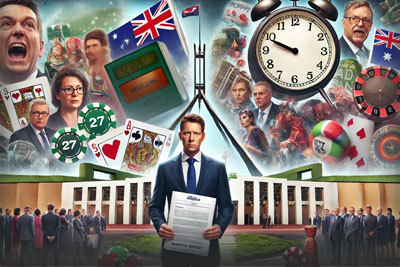 Australia’s Greens party has intensified its campaign to end gambling advertising by introducing a bill to the Senate that seeks a complete ban on gambling ads across all forms of media. The Ban Gambling Ads Bill, championed by Greens Senator Sarah Hanson-Young, aims to prohibit gambling promotions on TV, radio, print, and online platforms. This follows increasing public pressure and growing political debate over the impact of gambling on Australian society.
Australia’s Greens party has intensified its campaign to end gambling advertising by introducing a bill to the Senate that seeks a complete ban on gambling ads across all forms of media. The Ban Gambling Ads Bill, championed by Greens Senator Sarah Hanson-Young, aims to prohibit gambling promotions on TV, radio, print, and online platforms. This follows increasing public pressure and growing political debate over the impact of gambling on Australian society.
Push for Comprehensive Advertising Ban
The proposed legislation, introduced on October 9, calls for a blanket ban on gambling advertisements in a bid to reduce gambling-related harm. This initiative builds upon the 2023 Peta Murphy Inquiry, which recommended a full prohibition on gambling ads to tackle the proliferation of betting promotions and the harm they can cause. According to Senator Hanson-Young, the Greens party’s bill seeks to address the concerns of Australians who are “sick of having gambling ads rammed down their throats during family time.”
“Problem gambling ruins lives, and Australians lose more per capita to gambling than anywhere else in the world,” Hanson-Young said while presenting the bill. “The evidence is clear: gambling ads cause significant harm, and they must be banned, just like tobacco ads.”
The Greens’ push for a ban comes as the Australian government has been considering its response to the Murphy Report’s 31 recommendations, which were published in June 2023. The report, named after the late Peta Murphy MP, included calls for the introduction of a gambling ombudsman, a harm-reduction levy, and tighter national regulations for the gambling industry.
Despite widespread public support for the recommendations, the federal government has been slow to act, with Communications Minister Michelle Rowland stating that an official stance on gambling ads would not be announced until the end of 2023. The government faces only a few remaining parliamentary sitting weeks this year to discuss the issue further.
Political Debate and Industry Concerns
The debate surrounding gambling advertising has seen politicians across party lines weigh in on the issue. Prime Minister Anthony Albanese previously expressed reservations about a full ban, suggesting that campaigners were more focused on banning gambling outright rather than just the ads. In September, he publicly dismissed calls for a total prohibition, stating that such measures might be “the easy option” but not necessarily the most effective in addressing gambling addiction.
On the other hand, addiction charities, some politicians, and various advocacy groups have voiced strong support for the Greens’ bill. They argue that a comprehensive ban is essential to curb what they describe as a “flood” of gambling ads that encourage risky betting behavior. A recent public poll indicates that 7 in 10 Australians favor banning these ads, underscoring the growing frustration among the public.
However, media agencies and gambling operators have warned that such a ban could have significant economic consequences, particularly for free-to-air broadcasters and affiliates who rely on gambling advertisements for revenue. Bill Shorten, a government minister, defended the media’s position, claiming that banning gambling ads would severely undermine Australia’s free-to-air channels.
Hanson-Young responded to these concerns during her Senate speech, arguing that Australia’s media should not rely on revenue generated by promoting gambling addiction. “We’re in real trouble if our national media has to rely on gambling ads to survive,” she stated.
Impact on Industry and Affiliates
The potential advertising ban is also raising concerns within the gambling industry, particularly among affiliates who have traditionally relied on paid media channels to promote betting offers. Should the bill pass into law, it would close off major customer acquisition avenues such as TV, radio, and online ads, putting affiliates under pressure to adapt their strategies.
Affiliates may face limitations in driving traffic to gambling platforms, and there is uncertainty over whether content-based marketing, such as sports blogs or review sites with affiliate links, would be impacted by the ban. Some industry experts suggest that affiliates may need to shift their focus to more organic growth strategies, such as creating in-depth reviews and responsible gambling content.
Despite the potential challenges, proponents of the ban argue that the risks posed by unchecked gambling ads outweigh the economic concerns raised by media companies and affiliates.
What’s Next for the Ban Gambling Ads Bill?
The Ban Gambling Ads Bill is currently in its second reading in the Senate. If it passes this stage, it will enter the Senate committee phase, where the details of the proposed legislation will be scrutinized further. The bill may be referred to a committee inquiry for more in-depth analysis before the wider Senate votes on its final form.
For the bill to become law, it must receive royal assent after passing through the Senate and House of Representatives. Given the limited number of parliamentary sessions left this year, it remains to be seen whether the bill will progress before the year’s end.
As the debate continues, all eyes are on the Australian government to see how it will handle the growing public demand for tighter restrictions on gambling ads, and whether the Greens’ proposal for an outright ban will succeed.
Source:
“Australia’s Green party files blanket gambling ad ban bill, government response to Murphy Report due by end of year “, igamingbusiness.com, October 11, 2024.




